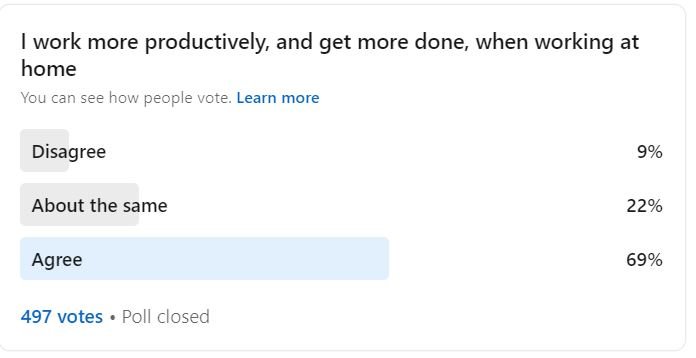I love this cover piece from People Management, above: “Excellent that you were out when I visited.” It says all that needs to be said about the new hybrid working environment.
It is, of course, a critique of the note that Jacob Rees-Mogg left on the desks of civil servants in his office: “Sorry you were out when I visited. I look forward to seeing you in the office very soon.” For Rees-Mogg, it is all about presenteeism.
And Johnson backed him up by saying, based on zero evidence, that working from home doesn’t work because people spend too much time drinking coffee and eating cheese.
So I decided to set up a poll on LinkedIn to ask people whether they were more productive at the office or at home. Of the almost 500 that replied, the result was overwhelming:

69% agree that ‘I work, more productively, and get more done, when working from home,’ against just 9% disagreeing. (And 22% saying about the same.)
Is this just my contacts? Well, YouGov did a survey in April on ‘do you think office workers are more productive when they work from home?’
The response was very age related.
- Among 25-49 year olds, 43% said more productive at home, against 20% at work
- Among 50-64s: 35% more productive at home, against 30% at work
- Among 65+: 21% more productive at home, against 43% at the office
So it is only those who are no longer working who believe people can’t be productive at home. (I wonder if this is the target market that Johnson is aiming for.)
And there is one key difference between these two surveys: The YouGov one refers to other people, mine asks if ‘I work more productively.’ Do people feel they are more productive at home but other people aren’t?
At Happy we are perfectly okay, and always have been, with people working wherever they need to be to get the work done.
The government doesn’t seem to be aware of what has actually been going on its own departments. Even before the pandemic, the Ministry of Justice had set up a central London office whose capacity only enabled its staff to work there 3 days a week, for example.
People are voting with their feet. I am told that recruitment companies are finding that if a job enables working from home, it gets twice the responses of one that requires you to be in the office.
Even before the pandemic I remember somebody visiting our office and commenting that there were only four people there (out of 25).
“Where are all the others?” they asked.
“I have no idea,” was my response.
I had no interest then, and have no interest now, in where our people are. If they need to be in the office, they will be. If they are more productive working from home, that is fine.
Of course it’s not just one or the other. The new hybrid work environment will probably find office workers spending a day or two in the office, to get that social engagement and buzz, and the rest of the time at home.
For me I find it very odd when the senior leaders in organisations find the need to tell people they need to be in the office.
I did hear one interesting example of this. In one company, people are given the choice between working at least 10 days a month in the office, or spending all their time at home. But if they choose the 10 days, they get an extra 5 days of holiday.
For me it’s simply about trust. Isn’t it time to judge people on the outcomes, not on how much time they spend in the office?
So, do you work more productively at home or at the office?






















